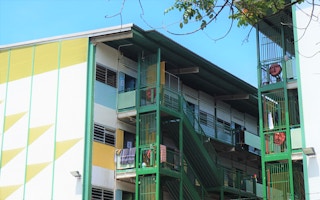Amid fresh concerns over the prolonged isolation of Singapore’s dormitory-dwelling migrant workers and their mental health, 23 environmental groups in the country have called for decent working and living conditions for the workers and fair reward for their labour.
To continue reading, subscribe to Eco‑Business.
There's something for everyone. We offer a range of subscription plans.
- Access our stories and receive our Insights Weekly newsletter with the free EB Member plan.
- Unlock unlimited access to our content and archive with EB Circle.
- Publish your content with EB Premium.
Highlighting the link between environmental justice and systemic inequalities that migrant workers in Singapore face, the groups said improved dormitory standards do not address other problems the workers face: High recruitment fees, low wages, lack of employment protection and access to healthcare, among other issues.
Such conditions have created a division between them and the citizens, long-term residents and expatriates of Singapore, they said in a statement released on Friday (7 August).
“This division is a microcosm of global inequality, which is deeply intertwined with environmental injustice,” they stated.
“We import cheap labour and resources to create wealth that only Singapore’s citizens, residents, and expats enjoy; yet the embedded costs are borne not just by migrant workers in Singapore, but their families at home as well,” they said.
“Singapore’s ever-expanding petrochemicals industry is a major contributor to the climate crisis. As a direct consequence, increasingly extreme weather threatens families, homes and livelihoods across the countries which many of our migrant workers come from, even though most had little part in causing the climate crisis.”
“
Pursuing economic growth and climate adaptation at the expense of migrant workers is not justice; it is not even progress.
Singapore environmental groups’ statement of solidarity with migrant workers
Singapore’s efforts to shield itself from the effects of climate change are also aided by migrant workers who help in land reclamation and the building of seawalls, green buildings and solar installations, the groups said. “We rely on their labour for our wealth and our survival; they deserve our respect and fair treatment. Pursuing economic growth and climate adaptation at the expense of migrant workers is not justice; it is not even progress.”
Environmental groups that signed the statement include 350 Singapore, LepakinSG, Green Is The New Black, Cicada Tree Eco-Place and Foodscape Collective. Estimated to comprise a few hundred members in total, the groups also included several student organisations such as Earthlink NTU (a club of Nanyang Technological University), NTU Divest, National University of Singapore (NUS) Students Against Violation of the Earth and NUS Students Taking Action for NUS to Divest.
The Covid-19 coronavirus pandemic has disproportionately affected lower-wage migrant workers in Singapore. In the crowded dormitories where about 300,000 lower-wage migrant workers live, delayed containment measures led to surge in Covid-19 cases and they have formed the vast majority of confirmed cases in the country.
And although the pandemic has hit the Singapore economy and many other workers, news reports in recent days have highlighted the stress of months-long confinement in dormitories, as well as uncertainties over their jobs, health and families in their home countries.
Since May, at least five workers have been detained under Singapore’s Mental Health Act for attempting to harm themselves, news outlet The Straits Times reported this week. Since April, when the authorities began isolating dormitories, there have been at least three cases of unnatural death involving foreign workers—two Indian nationals and a Bangladeshi, The New Paper, a Singapore tabloid, reported last month. Unnatural death cases include suicides.
Advocacy groups have called for changes including better healthcare and fairer treatment of workers, and criticised new rules that gave employers sweeping powers over their movements.
Singapore’s Ministry of Manpower told The Straits Times that there are plans to better support migrant workers’ mental health and allow them more freedom to leave their dormitories.
In their statement, the 23 groups urged the government to consider minimum wages for workers, regulate more strongly the recruitment fees that workers pay to secure jobs, and offer workers more flexibility to change employers or job sectors beyond current temporary measures.
“Most people do not connect the two issues of climate change and labour/migrant welfare. We are used to putting a single-issue lens to social issues; we recognise the symptoms of social problems without paying attention to the systems that create them,” said Tan Yi Han, one of the authors of the statement. “For us to move forward, it is crucial that civil society, businesses and the public see how all these issues are interconnected, and address them together.”












